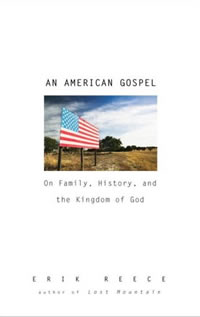Book Notes
 Erik Reece, An American Gospel; On Family, History, and the Kingdom of God (New York: Riverhead Books, 2009), 224pp.
Erik Reece, An American Gospel; On Family, History, and the Kingdom of God (New York: Riverhead Books, 2009), 224pp.
Erik Reece's grandfather and father were both Baptist preachers, but when his church burned to the ground the summer after he graduated from high school, he had had enough of compulsory fundamentalist faith. But extracting himself from family faith and exorcising his demons proved difficult. His father's suicide at the age of thirty-three when Reece was only three had medical roots, he admits, but it was badly aggravated by the "acute self-loathing," "life-negating principles," "oppressive faith," and "repressive morality" of his Christian heritage. When Reece himself experienced something like a nervous breakdown at the same age of thirty-three, he headed for a Buddhist monastery to purge his demons.
Reece interprets his personal experience as a tragic disconnect between Christianity that was a ticket to escape this evil world for the glories of heaven (so heavenly-minded you're no earthly good), and a lived faith that believes the kingdom of God is within you here and now. This is not an uncommon experience. His memoir offers a "radical revision," an alternative "apocryphal canon that I call the American Gospel," to this oversimplified paradigm.
Reece begins with stereotypes about the world-denying Puritans and contrasts them with the life-affirming "healthy-minded" religion of William James, and in particular with "a nearly forgotten Virginian named William Byrd." Byrd was a womanizing rake who loved his liquor, but in this telling he was kind to the Native Americans and had an "anti-Puritan reverence for wilderness." Next comes Thomas Jefferson. There's passing mention of Jefferson's slaves, his aristocratic tastes, and Sally Hemings, but for Reece Jefferson is the quintessential agrarian in contrast to the financial-industrialist Alexander Hamilton.
Reece found a faith he could believe in the Gospel of Thomas, which he contends is a "more authentic" version of Jesus, the "purest form" of the faith, and a "profound corrective" to mainstream Christianity. Remarkably, he finds direct parallels between this ancient Thomas and Thomas Jefferson. In his final chapter he appeals to the wisdom of Walt Whitman, who wrote: "What do you suppose I would intimate to you in a hundred ways, but that man or woman is as good as God? And that there is no God any more divine than yourself? And that that is what the oldest and newest myths finally mean?"
I don't doubt for a moment that Reece is in a far better space and place than he was with his fundamentalist heritage. Nor do I deny elements of truth in the stereotypes that he employs. Problems arise when he connects his personal experience with a highly selective reading of the trajectory of the gospel and American history. The tip-off is especially apparent when he argues that "most scholars agree" that the infancy narratives in Matthew and Luke are "pure myth," that dating the gospel of Thomas is a simple matter, or that Jefferson's scissored-down Jesus is more than a mild moralizer. Along the way Christianity is implicated for its complicity with industrialism, consumerism, and corporatism, another simple stereotype with elements of truth but which also neglects a long and deep history of alternate voices. All this makes for a memoir full of good points badly made.


